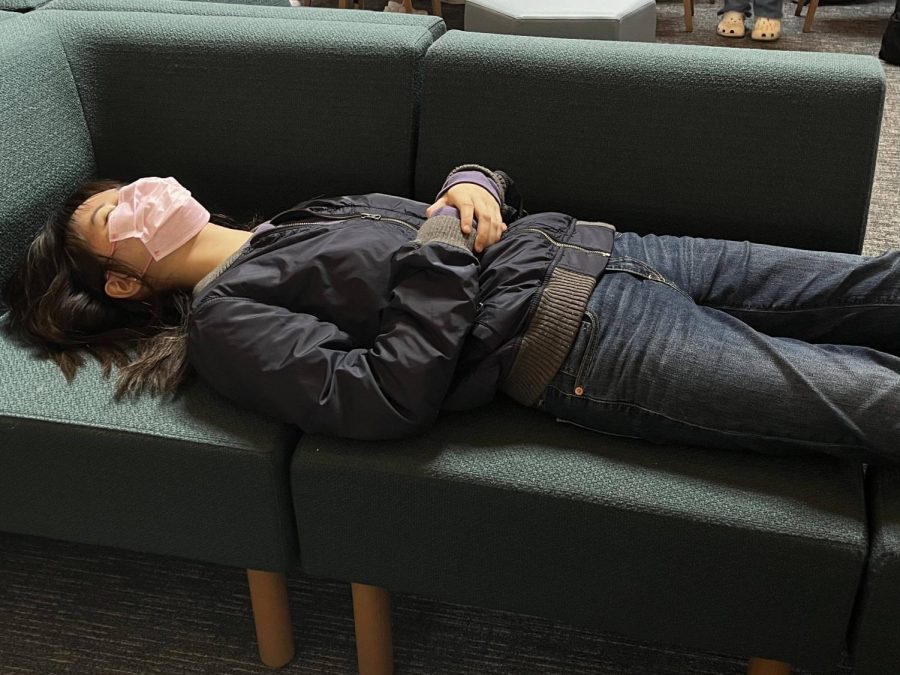We sometimes get sleepy in class or at least observe others getting exhausted but are unable to adjust based on rigid class schedules. As reflected by many peers, many Webb students have poor sleeping hygiene. What will be the effect? And what are some ways we can do to improve our sleeping habits?
We asked students to report their average sleeping time during both weekend days and weekdays. Next, we recorded the overall stress level the student felt ranging on a scale of ten, with ten being the most stressful. The results were surprisingly consistent. Students with less than seven hours of sleep typically experienced higher levels of stress than students with eight to ten hours of sleep. The effect of sleep on the student’s conditions is extremely apparent, and this is reflected in all grade levels.
Jay Pang (‘25), who had an average of six hours of sleep, reported having “10 out of 10 stress.” Although he “sleeps whenever he can,” which can equal or even exceed eight hours of sleep, intermittent sleep is not a good choice to make up for the continuous sleep that a teenager needs at night. Similarly, Tiger Wang (‘24) sleeps around seven hours at night and records that he has a lot of stress.
On the other hand, Candice Tang (‘26), who sleeps eight hours at night, has much less stress. Her response showed that she sleeps for eight hours without interruption and does not take extra naps in the middle of the day. Her stress level was a six out of ten.
People might think that due to the grade level of each individual, their workload can affect their stress level. However, Jamie Zeng (‘23) commented “when I slept less, my stress level will maybe be a seven or eight and when I slept more, my stress level will be like a four or five.” Continuous slumber during the night can not only help you restore energy but also decrease the amount of stress during the daytime.
It is important to acknowledge that the sleeping habits of many Webb students is not ideal. Short sleep, interrupted sleep and late-night devices are often present, and the pattern and duration of sleep varies greatly between midweek and weekend. What are some ways to improve the sleep hygiene of Webb’s peers to make them better prepared for the next day’s busy schedule?
“Sleep is the starting basis of the homeostasis process,” said Melanie Bauman, Director of Wellness. “The better sleep hygiene we have, the better overall functioning our body has.” As shown by the National Cancer Institute, homeostasis is a state of balance among all the body systems needed for the body to survive and function correctly. Unlike what people usually perceive, sleeping hygiene is more important than sole sleeping time. Therefore, some may still not be able to rest properly even when getting enough sleep, given the recommended sleeping hours for teenagers is 8-10 hours per day.
REM sleep, or Rapid Eye Movement sleep, is a phase of sleep that plays a role in dreams, memories, processing the day’s information, and improving the development of your brain. “REM sleep is the most restorative sleep that we would dip into after 45 minutes of light sleep,” Ms. Bauman said. “It is essentially the sleep where we do download and decompress like a hard drive on computer. If we don’t hit that stage or interrupt that stage, our body will be off cycle to get to each sleeping stage naturally.”
While it is challenging to maintain good sleep hygiene with a busy and changing schedule, there are many areas that Webb students can pay attention to adjust accordingly.
For example, some Webb students believe that they can catch up on sleep by afternoon naps or sleep an extra hour the next evening. Unfortunately, the human body cannot “bank,” or catch up for sleep. A 20-minute nap feels restorative because of the stopping of input of information, but the body doesn’t really go through a sleep cycle. Over-napping may even harm the sleep cycle: longer naps will kick the body into crisis mode and impact sleep cycle later in the day.
In addition, the alarm clock in the morning is also more influential than we think. “Students may set up an alarm every five minutes in the morning and just snooze all the way through,” Ms. Bauman said. “They’re basically interrupting their sleep cycle every single time and will still feel tired because they never have that full sleep cycle.” In order not to interrupt this sleep process, students can try to get up at one or two alarms.
Finally, a big challenge is the intersection of working and sleeping locations. “Boarding students in particular don’t have that natural separation,” Ms. Bauman said. “They might be doing their homework in their bed, which interrupts the hygiene when the purpose of the bed is no longer only for sleep.” To avoid this situation, students should be actively involved in evening labs more. Alexis Mumbo (‘25) usually spends her study hours in the library and reflects a positive working status. “I get distracted easily in my dorm,” Alexis said. “But I can focus more on my homework in the library.” By giving ourselves a chance to study in Hooper or the library, our body can more clearly distinguish the purpose of dorms, which will be more helpful to sleep hygiene.
Many Webb students need to improve their sleeping hygiene in order to have a refreshing next day. The strategies presented above can allow students to start or continue a well-planned sleep schedule. It is also important to acknowledge the underlining factor that lies within “good sleep.” Simply sleeping eight hours without interruption can lead to a better life overall for the students at Webb and their life beyond Webb.





![All members of the Webb Robotics Winter season teams taking a group photo. Of note is Team 359, pictured in the middle row. “It was super exciting to get the win and have the chance to go to regionals [robotics competition]” Max Lan (‘25) said. From left to right: Max Lan (‘25), Jerry Hu (‘26), David Lui (‘25), Jake Hui (’25), Boyang Li (‘25), bottom Jonathan Li (’25), Tyler Liu (‘25)](https://webbcanyonchronicle.com/wp-content/uploads/2025/03/Screenshot-2025-03-10-at-2.41.38 PM.png)




